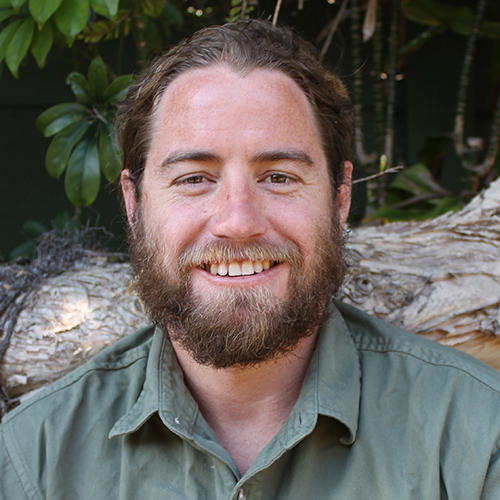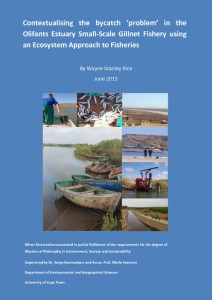Wayne Rice
About
 Wayne Rice is a PhD. student in the Department of Environmental and Geographical Sciences at the University of Cape Town, South Africa. He obtained an undergraduate degree in Biological Sciences as well as a Post Graduate Certificate in Education from the University of Stellenbosch, South Africa, and has taught high school Sciences both locally in South Africa as well as abroad for 5 years. He took a keen interest in better understanding students from diverse linguistic backgrounds and so pursued a masters by coursework degree in Teaching English to Speakers of Other Languages (TESOL/Applied Linguistics). After teaching Environmental Sciences in the American Diploma as well as the International Baccalaureate (IBO) programme he decided to pursue further postgraduate studies in the Environmental Sciences arena, which led to his enrolment at the University of Cape Town for the masters by coursework and thesis degree entitled Environment, Society and Sustainability. His research interests include natural resource and coastal governance; marine and terrestrial conservation; community-based conservation; fisheries systems, especially small-scale fisheries (SSF); and sustainable livelihoods. He intends upon completion of postgraduate work to pursue a career in research and tertiary education. His interests and hobbies include trail running, scuba diving, and surfing among many others.
Wayne Rice is a PhD. student in the Department of Environmental and Geographical Sciences at the University of Cape Town, South Africa. He obtained an undergraduate degree in Biological Sciences as well as a Post Graduate Certificate in Education from the University of Stellenbosch, South Africa, and has taught high school Sciences both locally in South Africa as well as abroad for 5 years. He took a keen interest in better understanding students from diverse linguistic backgrounds and so pursued a masters by coursework degree in Teaching English to Speakers of Other Languages (TESOL/Applied Linguistics). After teaching Environmental Sciences in the American Diploma as well as the International Baccalaureate (IBO) programme he decided to pursue further postgraduate studies in the Environmental Sciences arena, which led to his enrolment at the University of Cape Town for the masters by coursework and thesis degree entitled Environment, Society and Sustainability. His research interests include natural resource and coastal governance; marine and terrestrial conservation; community-based conservation; fisheries systems, especially small-scale fisheries (SSF); and sustainable livelihoods. He intends upon completion of postgraduate work to pursue a career in research and tertiary education. His interests and hobbies include trail running, scuba diving, and surfing among many others.
PLACE
Case study site selection is currently in progress but will attempt to focus on African and especially Southern African local conservation initiatives. Namibian community wildlife conservancies have been highlighted as an ideal study area, with Botswana, Zambia, Tanzania, Kenya and Madagascar containing some additional sites of potential to this study.
WORK/RESEARCH
Concerns surrounding the promotion of national and international conservation agendas at the expense of local livelihood requirements have led to interest in community-based conservation (CBC) initiatives, which seek to include local community participation and knowledge in natural resource management. Nonetheless, many scholars would agree that early excitement associated with CBC has diminished to a large extent, in light of various studies depicting the lack of success of CBC in meeting ecological and social goals. The implementation of community-based natural resource management approaches (CBNRM), used synonymously with CBC, in Southern Africa since the early 1990’s have yielded mixed results, due perhaps in part to conventional scientific approaches which have not adequately incorporated complex human dimensions. In addition, the failures to devolve decision-making powers to local communities, the difficulty of equitable distribution of benefits and weak participation have perhaps equally contributed. However, several CBC success stories do exist globally, for example in fisheries and reef conservation in Polynesia and the Coral Triangle (see Mills et al., 2011, Maliao et al 2009, and Hamilton et al., 2011); forestry and fishery management in Latin America (see Shanee et al., 2014; McCay et al., 2014) and Indigenous Protected Areas in Australia (see Ross et al., 2009). Additionally, some progress and success has been observed in Africa, especially in wildlife and coastal management in Kenya, Botswana and Namibia (see for example Kuriyan, 2002, Measham & Lombardi, 2013, and Cinner & McClanahan, 2014 in Kenya; Mbaiwa, 2004, and Thakadu, 2005 in Botswana; and Boudreaux 2010, and Mufune, 2015 in Namibia; among others).
Wayne’s doctoral dissertation seeks to identify context-specific critical enabling conditions present in local conservation initiatives, within the region of Southern and East Africa, that lead to sustainable and socially just people-inclusive conservation initiatives in order to inform and enrich conservation planning and management approaches and contribute to the theory and practice of people-inclusive conservation in the region. The research approach comprises three phases; firstly, to conduct a meta-analysis of published and unpublished literature to identify critical enabling conditions that support robust people-led conservation within local initiatives in developing nation contexts. Secondly, to assess the de facto social and ecological status of selected case study sites of local people-inclusive conservation initiatives in this specific region through the use of a consolidated set of externally (i.e. based on relevant literature) and internally (i.e. in consultation with all relevant stakeholders) selected indicators. Thirdly, to identify the presence or absence of the above identified set of critical enabling conditions within the selected conservation initiatives in order to ascertain which conditions are vital in the context of Southern and East Africa for sustainable people-driven conservation. By gaining a holistic understanding of complex CBC systems in Southern and East Africa, this research will provide new knowledge to the growing body of work on CBC initiatives at a local-scale by building on the sustainable commons work of Wade (1987), Ostrom (1990), Balland & Platteau (1996), and Agrawal (2002) among others. Furthermore, based on the findings of the study important recommendations will be made for future conservation planning and management within the established specific contexts from a more people-inclusive conservation perspective.
KEY PUBLICATIONS

Contextualising the bycatch problem in the Olifants Estuary using an Ecosystem Approach to Fisheries – W. Rice
Rice, W. 2015. Contextualising the bycatch ‘problem’ in the Olifants Estuary Small-Scale Gillnet Fishery using an Ecosystem Approach to Fisheries. Minor Dissertation presented in partial fulfilment of the requirements for the degree of Masters of Philosophy in Environment, Society and Sustainability. Department of Environmental and Geographical Sciences, University of Cape Town.


